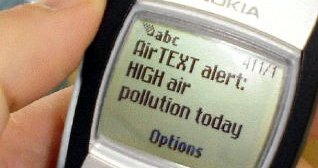Text messages to help Londoners breathe easier
Free SMS alerts to warn people with asthma and other related conditions of high air pollution levels in the capital.


Londoners with asthma are to receive free text messages alerting them to high pollution levels in their local areas.
Following a successful pilot project in Croydon, the airTEXT service has been launched across most of London, allowing sufferers of asthma, emphysema, heart disease or angina to register online for free to receive text, voice or email alerts when health-threatening air pollution levels are predicted.
The messages will give details about potential symptoms and advice on how to avoid them, such as staying indoors or increasing medications. A sample text read: "Moderate air pollution tomorrow. You may notice mild health effects but these are unlikely to require action. If you have concerns please consult your GP."
'This pioneering service will provide people with crucial information about peak periods of air pollution localised for their part of London so they can take action." said deputy London mayor Nicky Gavron.
Developed by Cambridge Environmental Research Consultants (CERC), the airTEXT pollution forecasts use satellite air quality data as well as information from traffic patterns and local monitoring stations.
"Previously, air pollution forecasts have been focused on very large geographical areas and the methods for communicating the information have been poor," said CERC scientist Dr Iarla Kilbane-Dawe.
During the Croydon pilot, users would receive a text message by 7:30pm if poor air quality was predicted the next day, allowing them time to change their plans if necessary. About 45 alerts were sent out each year of the pilot, which began in July 2005. A recent survey of user found 80 per cent of pilot users thought the service helped them manage their symptoms better.
Get the ITPro daily newsletter
Sign up today and you will receive a free copy of our Future Focus 2025 report - the leading guidance on AI, cybersecurity and other IT challenges as per 700+ senior executives
The project is paid for by the European Space Agency and CERC with support from the Greater London Authority and the Department of the Environment Food and Rural Affairs.
Freelance journalist Nicole Kobie first started writing for ITPro in 2007, with bylines in New Scientist, Wired, PC Pro and many more.
Nicole the author of a book about the history of technology, The Long History of the Future.
-
 Should AI PCs be part of your next hardware refresh?
Should AI PCs be part of your next hardware refresh?AI PCs are fast becoming a business staple and a surefire way to future-proof your business
By Bobby Hellard Published
-
 Westcon-Comstor and Vectra AI launch brace of new channel initiatives
Westcon-Comstor and Vectra AI launch brace of new channel initiativesNews Westcon-Comstor and Vectra AI have announced the launch of two new channel growth initiatives focused on the managed security service provider (MSSP) space and AWS Marketplace.
By Daniel Todd Published